21 de abril 2021

Children of Exile: The Births “Sowing Hope” in the Camp of Nicaraguan Farmers

PUBLICIDAD 1M
PUBLICIDAD 4D
PUBLICIDAD 5D
A Mother of April, a former political prisoner, the wife of a political prisoner, an expelled student and an unemployed man tell how their lives change
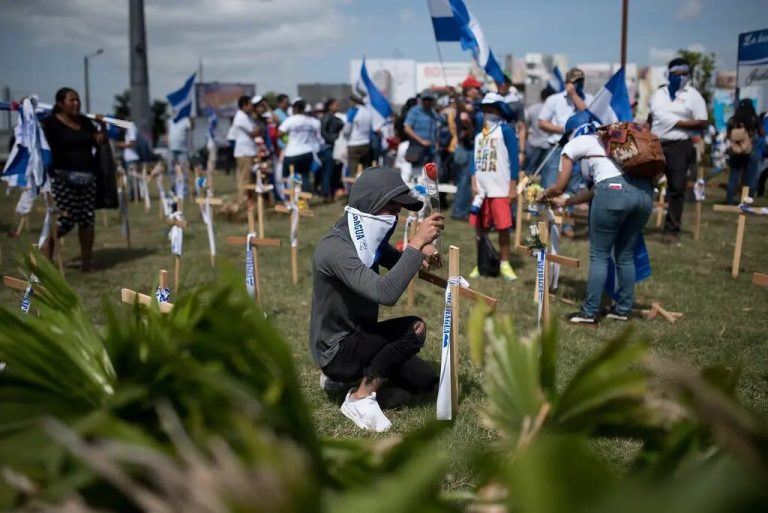
A Mother of April
On April 18, 2018, the course of Nicaragua changed forever. The brutal repression and massacre that was ordered by the regime of Daniel Ortega and Rosario Murillo against Nicaraguans who demanded justice, freedom and democracy caused death, pain, unemployment, jail, separation of families, siege and a lot of anger. Three years after the social outburst known as “April’s Rebellion”, we talked to five Nicaraguans who told us how their lives have been transformed since that day.
"It looks like Bambi!" was the phrase that caused Nelly Lopez to run out of her house, amidst dozens of gunshots, to look for her nephew, Erick Jimenez Lopez. She did not have to go far to realize that it was him. His body was lying in the street, less than a hundred meters from her house, shot in the chest. She threw herself on him and hugged him. The shooting did not stop.
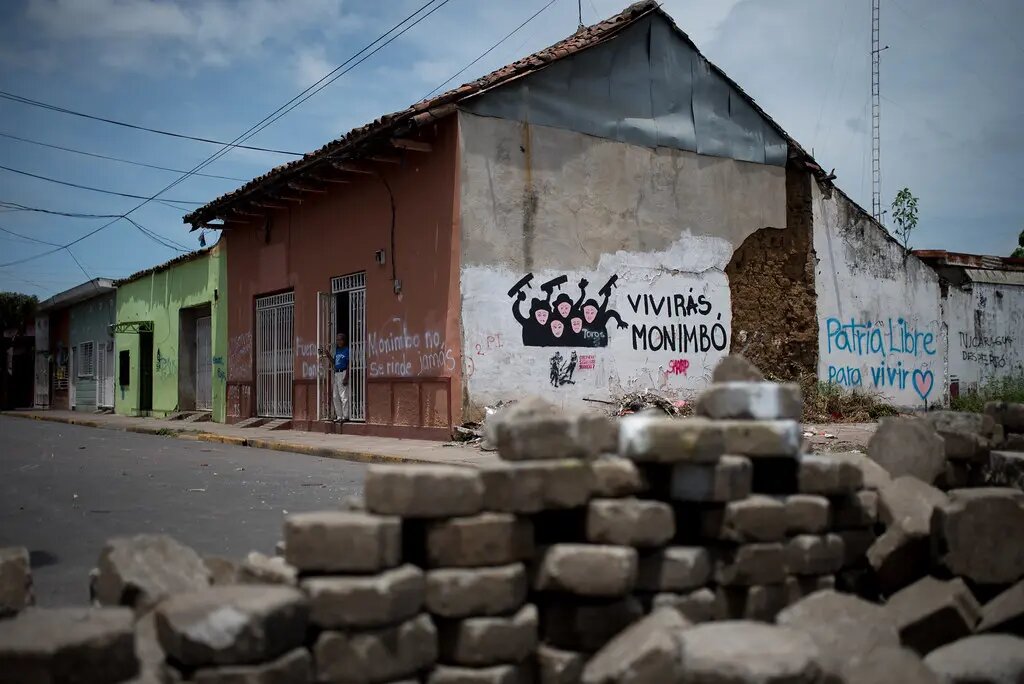
A barricade on the main street of Monimbó, Masaya, June 4, 2018. // Photo: Archivo | Carlos Herrera | Confidencial
It was July 17, 2018. Dozens of paramilitaries and police executed the violent "Operation Cleanup", in Masaya, which aimed to end the civic resistance in that city. "Bullets were passing over me, but I couldn't leave and let them take his body," Nelly recalls.
That day Erick had tried to go to work, but when he reached the barricades he was warned that the paramilitaries were attacking Monimbó. "He went back home crying, indignantly," his maternal aunt recalls. He drank coffee and immediately said he could not sit idly by. "He went to try to help the kids and when he was returning home, at about ten o'clock in the morning, he was murdered," his aunt explains.
"That woman should die like a dog, like the dog she has next to her". One of the hooded paramilitaries shouted this phrase as she remained clinging to her nephew’s body. Although her husband shouted at her, telling her to get into the house, she did not desist.
During a moment of distraction from the paramilitaries, she took her chance to put Erick’s body on a board and take him home. "I was only thinking of how my mother would take the news, because aside from being his grandmother, she was like a mother to him. He was her little boy,” she says.
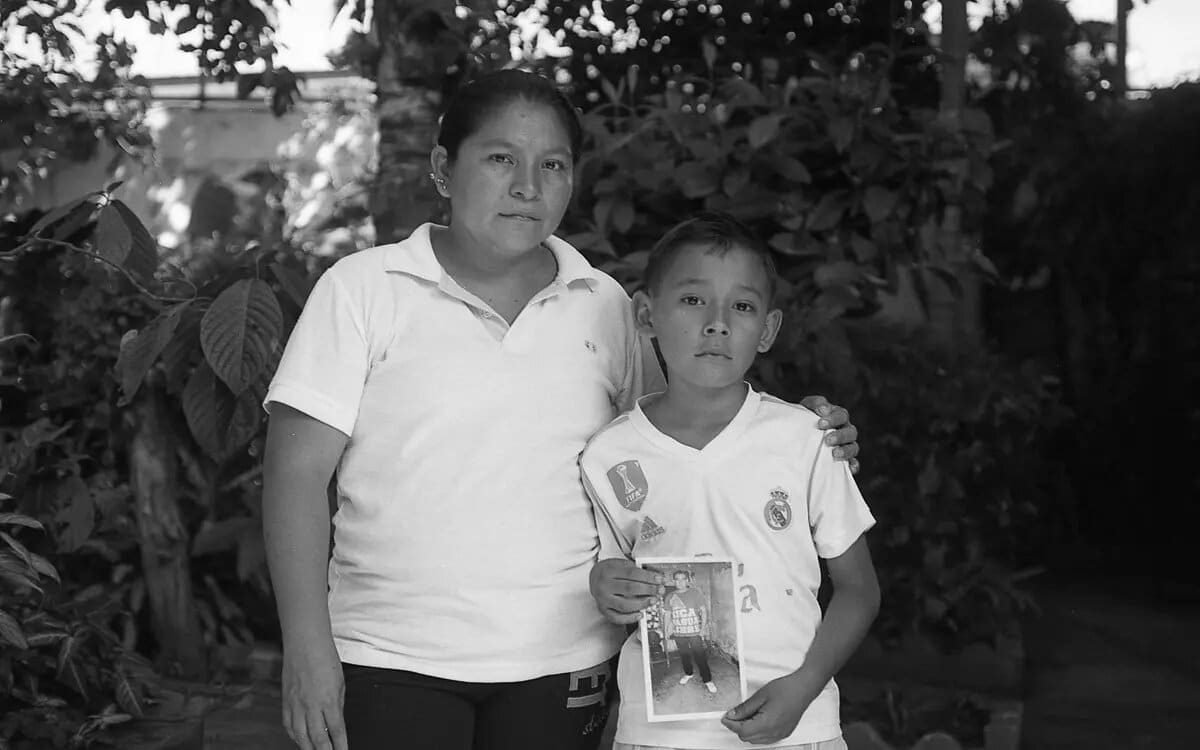
Nelly López with the son of her nephew Erick Jiménez López, killed by paramilitaries in July 2018. // Photo: Courtesy: AMA y No Olvida, Museo de la Memoria Contra la Impunidad, 2019.
Still crying, she went to find a coffin for Erick’s wake. An armed paramilitary threatened her, as well as a group of women who joined her. She showed him a white cloth and confronted him. "I had already lost my fear," she says.
At night, they illuminated the coffin with two candelabras, and by seven o'clock at night only the family remained, because the caravans of paramilitaries continued to pass through the streets.
The majority of the people who attended the funeral were women. They did not want young men to be there "because they could be killed".
Her nephew was 33 years old. They were almost the same age. "We grew up as siblings, he was a great support at the house. His death has left a huge amount of pain,” she insists. He worked in a free trade zone in Niquinohomo and left a seven-year-old boy behind. The kid is now like a son to Nelly.
Although she says that they were never at the roadblocks, protesting against the regime, she affirms that when they saw the violence with which the regime tried to crush the protests throughout the country, they supported the young people who barricaded themselves with provisions.
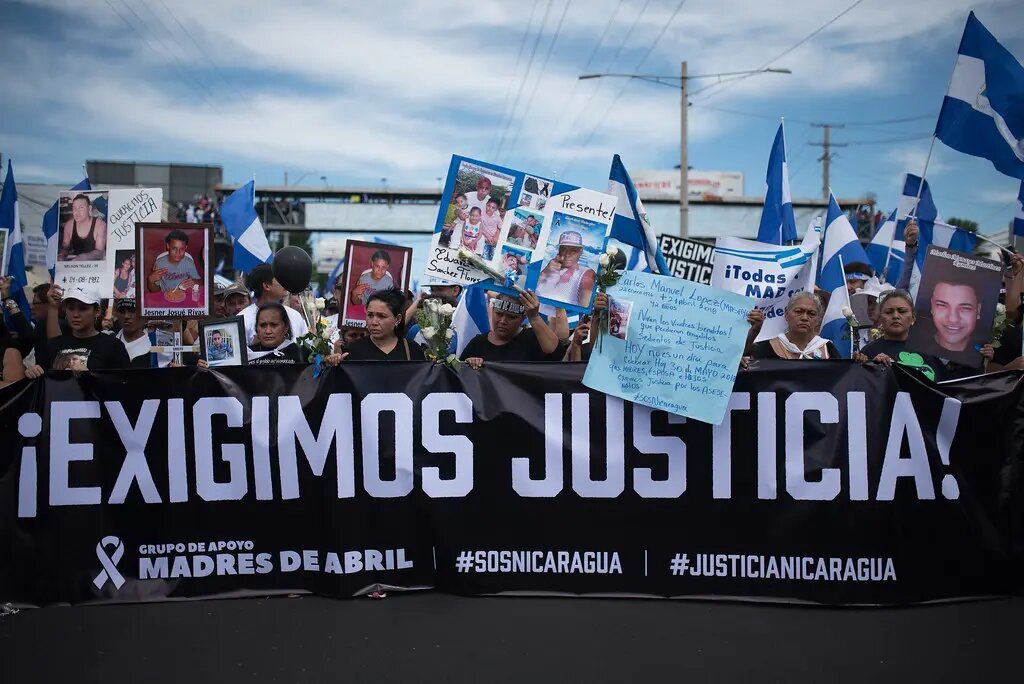
Mothers of April lead the march on May 30, 2018, in Managua // Photo: Archivo | Carlos Herrera | Confidencial
Two months after her nephew's murder, Nelly joined the Mothers of April Association (AMA), an organization that brings together the relatives of those killed by the State repression, to demand justice. She demands justice for her nephew, for the boy who is now 9 years old and remains in her care, and for the 324 others killed during the protests.
For Nelly, the April Rebellion was not in vain:
"They are afraid of us because if they weren't, they wouldn't deploy those zopilotes (police) on the roads and streets of Nicaragua. This country needs a complete cleansing and my nephew's blood will not go unpunished or forgotten.”
Today Nelly is unemployed. She left the free trade zone. Although she has searched for a job, she feels that many employers do not give her work because they associate her with the protests and prefer to avoid "problems with the regime."
Although she is going through difficult days, the memory of her nephew fills her with courage. Since that "black day" she has promised herself to continue fighting for justice.
A group of policemen formed at the entrance of the Masaya police station, and when Hanssel Vasquez arrived, he was greeted with punches and kicks. "They hit me with everything they had at hand, with helmets, with their guns. The pain was excruciating," he recalls.
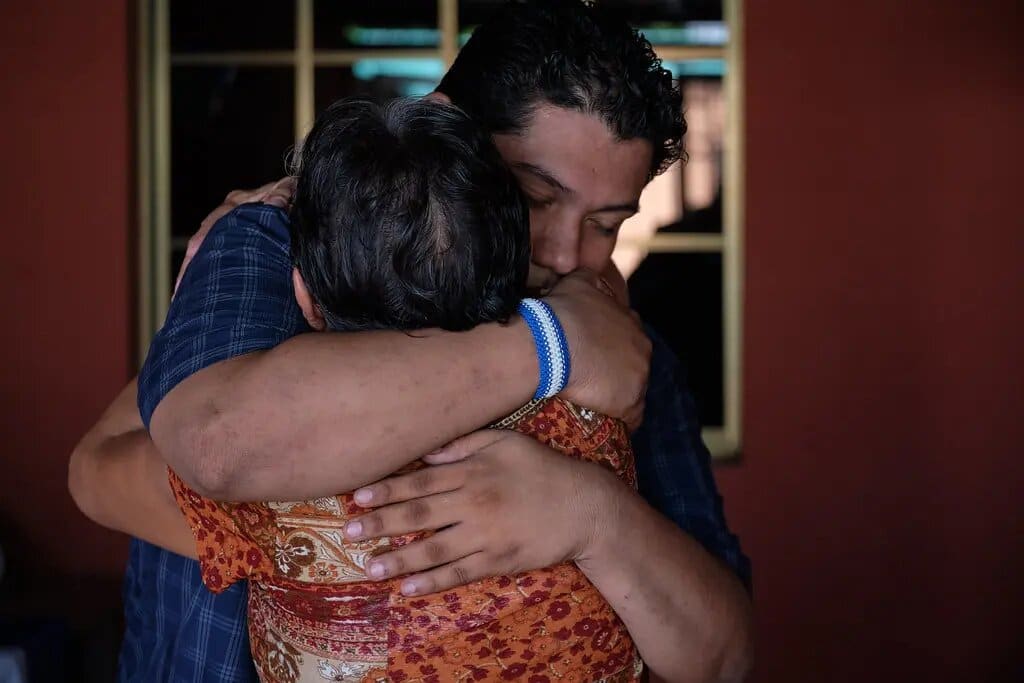
Hanssel Vásquez embraces family and friends after being released from prison on June 10, 2019. // Photo: Archivo | Carlos Herrera | Confidencial
It was July 11, 2018. Hanssel, along with his friends Rodrigo Espinoza and Marlon Fonseca, were arrested on their way to drop off food and medicine to young people protesting against the Ortega-Murillo regime in Masaya.
First their hands and feet were tied, he says. Then, at the station, they were interrogated for two hours. He was in a room where all he could hear were the screams of pain of his friends. "It was the most horrible episode of my life," he says.
That same night he was transferred to El Chipote prison, where he lived through thirteen long interrogations during three days. He went on without sleep, and almost without eating. "When you began to doze off, they took you out naked in front of a bunch of police officers and they kept asking you questions," he recalls.
They wanted to know who the leader was, who sent them to Masaya, why they opposed the government. Hanssel, in a slow voice, answered that no one had sent them and that they were only going to help some wounded students in that city.
But "hell", as he refers to his time in prison, was far from over. In "La Modelo" prison they continued to take him out for interrogation at dawn.
On October 16 of that year, along with his two friends, he was sentenced to 17 years and six months in prison: 15 years for the alleged crime of terrorism, two for weapons trafficking and six months for hindering public services. The regime's Prosecutor's Office also tried to charge them with "aggravated murder, attempted" for the burning of the pro-government Radio Ya.
"They accused us of so many made up crimes, but our only sin was protesting and helping the young university students who were demonstrating", assures Hanssel Vásquez.
He also survived a shooting and brutal repression in prison, when they held a protest on May 16, 2019. "They killed Eddy Montes that day," he recalls.
"The pastor", as they called him, was dedicated to promoting religious activities inside the prison. But they took his freedom and his life for protesting. At least 90 prisoners who participated in the protest were wounded and injured by the brutal repression of the Penitentiary System forces.
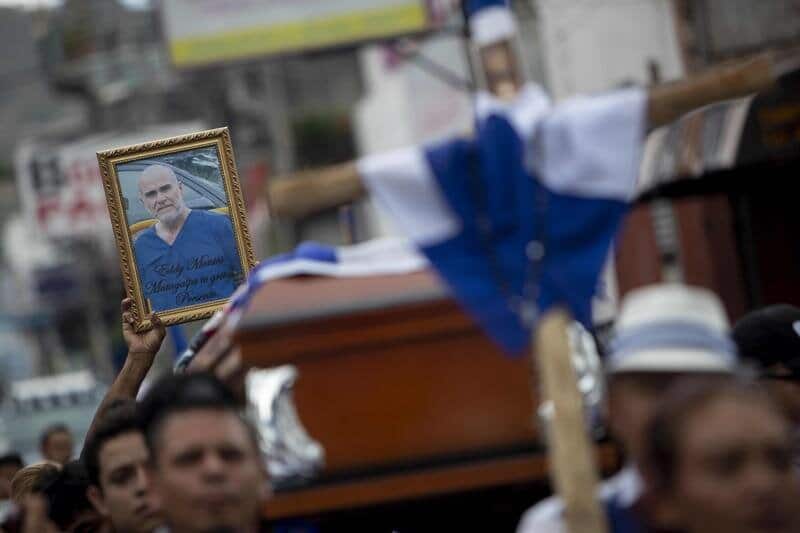
View of a portrait of Eddy Montes, during his burial and tribute in May 2019, in Matagalpa. // Photo: EFE
Hanssel was released from prison on June 10, 2019, under a controversial Amnesty Law, approved by the regime and marked as an attempt to leave the crimes against humanity, committed by the Nicaraguan State, unpunished.
In April 2018, he was 26 years old and working at a small advertising company he founded with two other friends. They already had eight regular clients and some temporary ones.
"I had a fixed income so I was financially stable," he details. He had left his job at the pro-government Channel 8, where he worked for more than three years, because he was tired of seeing how they hid the reality of the country.
During the first days of the protest he went out into the streets to take videos and photos, as part of his passion for journalism. He denounced the repression on his social networks.
Hanssel says that the civic struggle was worth it "and continues to be worth it" because "the people have the same belief and want freedom". However, he thinks that "the struggle has been distorted and people have become discouraged" due to political and economic interests of some sectors.
"It is an entire country that took to the streets. Those who want to take advantage, those who propose a way out of the dictatorship that generates impunity, will be exposed sooner or later. What they did to us is appalling and there will be justice someday", he claims.
He asks the opposition to be united and to advocate for the release of those who are in jail, as he was, "unjustly, for protesting".
"The problem is that everyone wants unity, but they all want unity around themselves. As long as they don't divest themselves of their interests, there will be no chance of defeating the dictatorship," Hanssel warns.
When they were imprisoned, the house where they worked was raided and more than $7,000 worth of equipment was stolen. Now he is volunteering with the Union of Political Prisoners of Nicaragua (UPPN) and offers his graphic design and video editing services "to people abroad, who are the only ones who hire me."
The worst thing that April has left him is a feeling of vulnerability. "You live in fear of being tortured again, of going missing," he says.
Some nights, Karen González Gutiérrez's three-year-old son asks her about his father, Wilber Antonio Prado. As best she can, she explains that he will be back with them soon. But, deep down, she has no idea when that will happen.
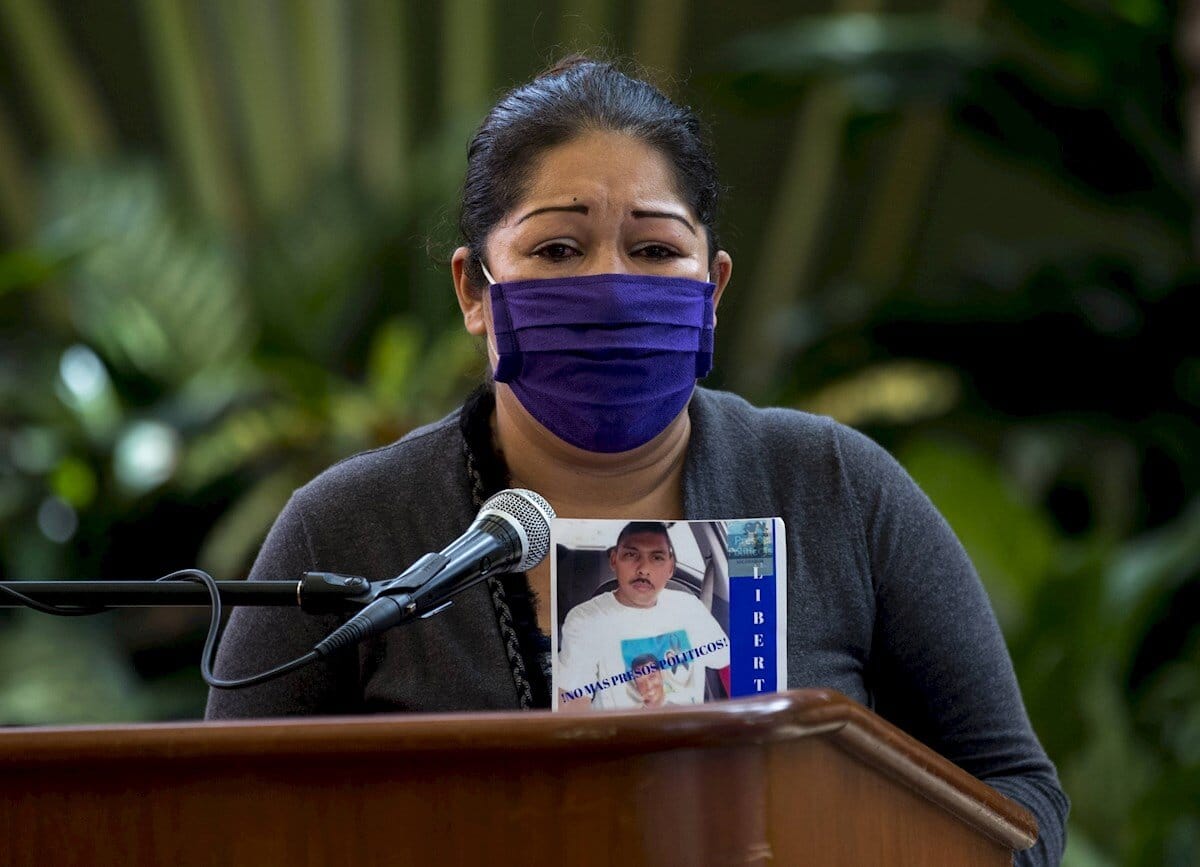
Karen González, wife of political prisoner Wilber Antonio Prado. // Photo: EFE | Jorge Torres
"The April protests were a hard blow for us because it has divided us on two occasions. It's a pain that I don't wish on anyone," she says.
Wilber is a recaptured political prisoner. He was first detained on September 3, 2018 and released on April 5, 2019, under the condition of a family coexistence regime. However, nine months later, on January 19, 2020 he was imprisoned again.
On the first occasion he was sentenced to three years and six months in prison on charges of burning a communal house of the Sandinista National Liberation Front (FSLN), in the VI district of Managua, and illegal possession of weapons. This time, he is accused of attempted homicide against two men.
Wilber worked as a cab driver to support his four children. For Karen, her husband's "cardinal sin" is having joined the barricades set up in 2018 in the María Auxiliadora neighborhood, where he grew up.
In 2018, he started going to the barricades at night, in the neighborhood where his mother lived. Then, he stayed day and night. He would go to the Polytechnic University of Nicaragua (Upoli) to bring food to his cousin, Jimmy Parajón, who was barricaded and who was killed from a gunshot to the chest on May 11 of that year.
"My husband only dedicated himself to working in the cab. It is all a vile set-up because it hurts them that he joined the protest and continued to denounce the murder of his cousin," she said.
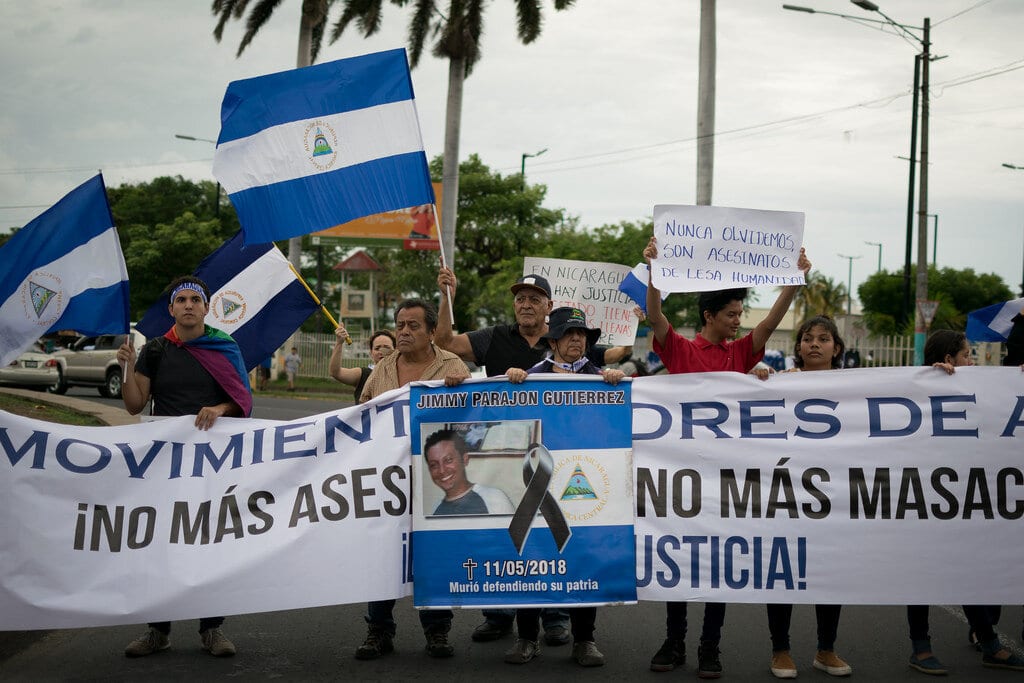
Relatives of Jimmy Parajón, killed while supporting Upoli students. Franklin Villavicencio | Confidencial
The first time he was released from prison he spent almost four months without sleep. "At night he would jump up and down in bed and wake up nervous. He would say that he felt suffocated and he would look out the window to see if no one came to spy on him," says Karen.
For her, "the trauma her husband went through in prison" was something he never finished telling her, but she suspects "it was terrible".
He took sleeping pills every night, and even though there were civilian trucks parked in front of their house, she told him that it was just his imagination to calm him down.
"Sometimes he would hallucinate, saying that he had seen a man inside the house and would pass by with a machete to defend himself," she says.
Although he went back to work in the cab, they were both prepared for him to go back to prison. "A Sandinista man in his neighborhood had threatened him. They're going to get you again, you bastard," he repeated every time he met him.
Karen González insisted to her husband Wilber Prado that he should leave the country, but he told her that he would not leave his family alone. He repeated: "I started in this struggle, they killed my cousin and I will not tire until this dictatorship is gone."
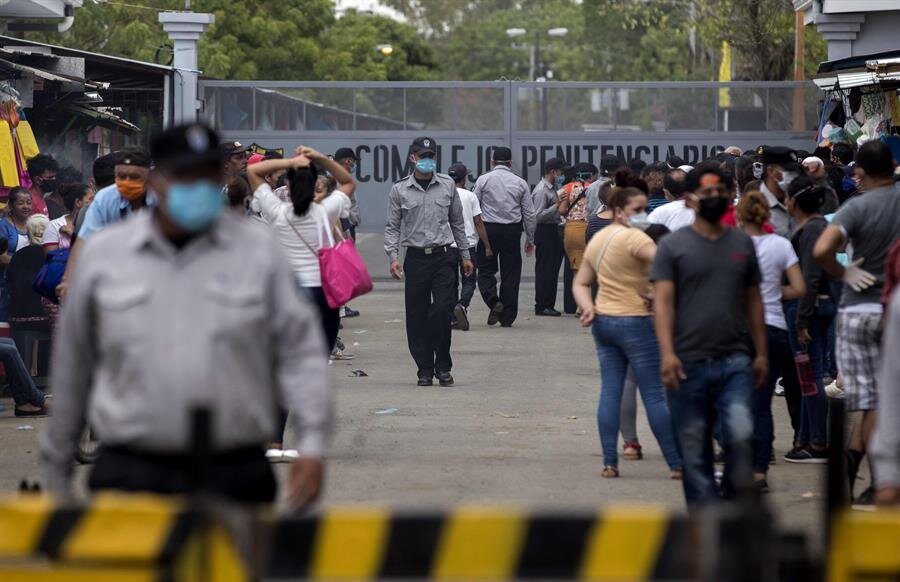
Agents of the National Penitentiary System secure the area after the announcement of the release of common prisoners in May 2020. Confidencial | EFE
Shortly after being recaptured, last year, he began to show symptoms of covid-19. But he was never attended to, Karen denounced at the time.
“He had a high temperature, constant headache and loss of smell, but they never said if he had coronavirus or not. He is alive, thank God, because they didn’t lift a finger for him,” she complains.
They have also limited the amount of food she can bring to prison for him, and although she is forced to sign a document stating that he is "in good condition" at every visit, she has refused to sign it.
Karen works as a housekeeper and regrets that the entire burden of the household has now fallen on her. "But I have seen him cry for his murdered cousin, and I know his fight is just," she says.
The first two times Elthon Rivera got involved, on the same day, treating people who were wounded during the protests against the Ortega-Murillo regime, was by chance. Although he had seen the news about the repression in Leon and Camino de Oriente on April 18, he went to complete his internship shift in Pediatrics at the Hospital Alemán Nicaragüense the next day. When his shift ended, he noticed that the Emergency Room was overflowing with wounded people from the National Agrarian University (UNA). "I put on my gown and stayed on to help where I could for a couple of hours. Everyone in the hospital was outraged at how they were repressing the students," he says.
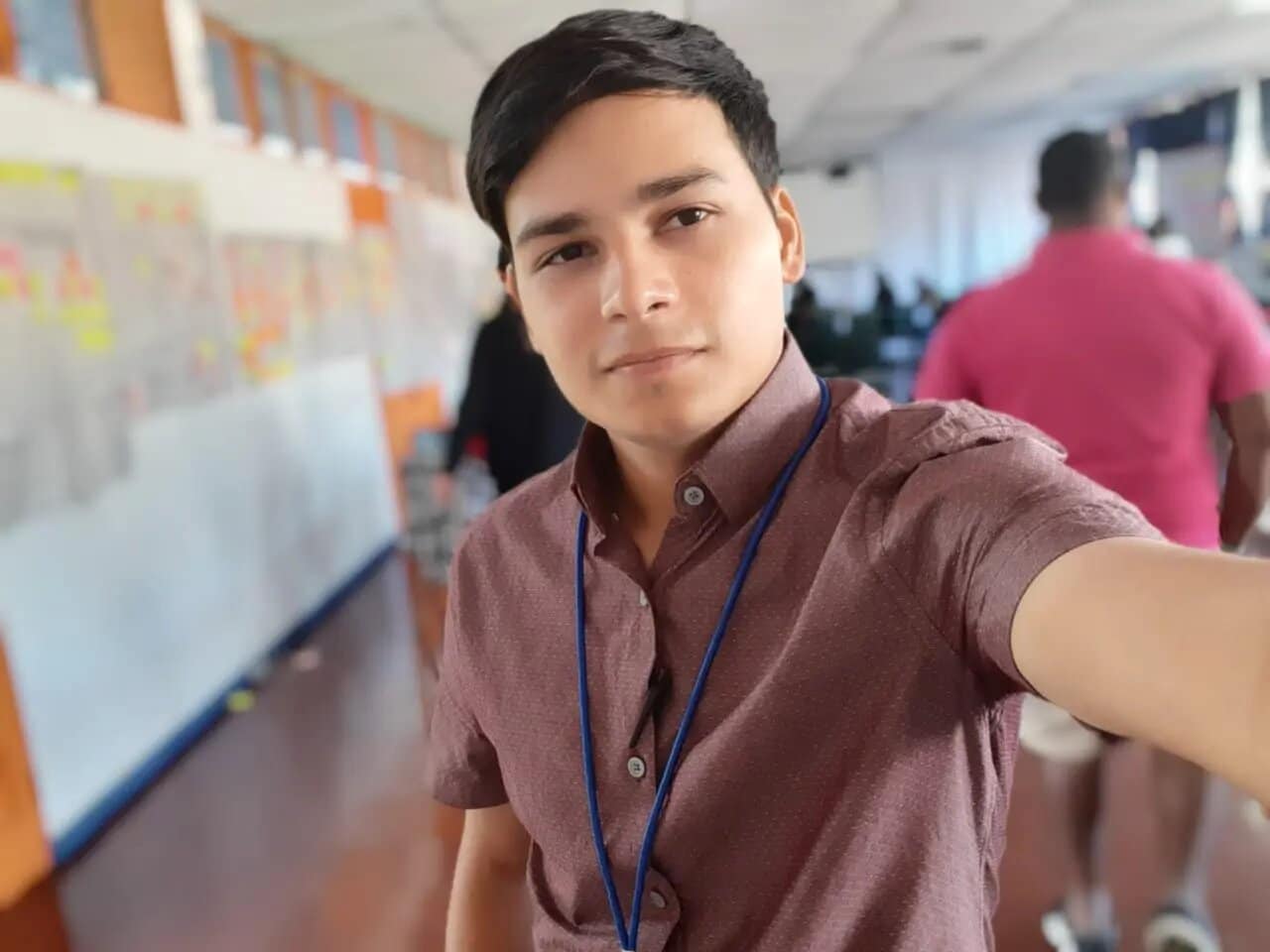
Elthon Rivera, medical student expelled from the UNAN-Managua // Photo: Courtesy: Confidencial | EFE
He arrived at the National Autonomous University of Nicaragua (UNAN-Managua) in the afternoon, but found that the gates were closed.He went to the sector of the National Engineering University (UNI) with a group of classmates, where the students were protesting.
"We were not protesters and we were just trying to help. We received medical products and we went to see how to treat more injured people," he explains. But in the midst of the violent police attack, after treating a young man wounded by a rubber bullet, he was trapped near a tyre repair shop. Riot police grabbed him, beat him and took him away in a patrol car.
It did him no good to show gloves, gauze and assure the police that he was doing humanitarian work. He was detained for six hours at Station One.
The indignation after the interrogation to which he was subjected made him "be part of the civic struggle of April," he says.
The photo of his detention went viral among university students. "I think that I was on file from the moment, but at the time I didn't give it any importance," he mentions.
During the student takeover of UNAN-Managua, Elthon returned to his home in Matagalpa. "Because I was afraid there would be a big repression," he says. A massacre that eventually took place on July 13, 2018 when police and paramilitary forces attacked the students who took refuge in the church Divina Misericordia for 17 hours. Two young men were killed: Gerald Vásquez and Francisco Flores.
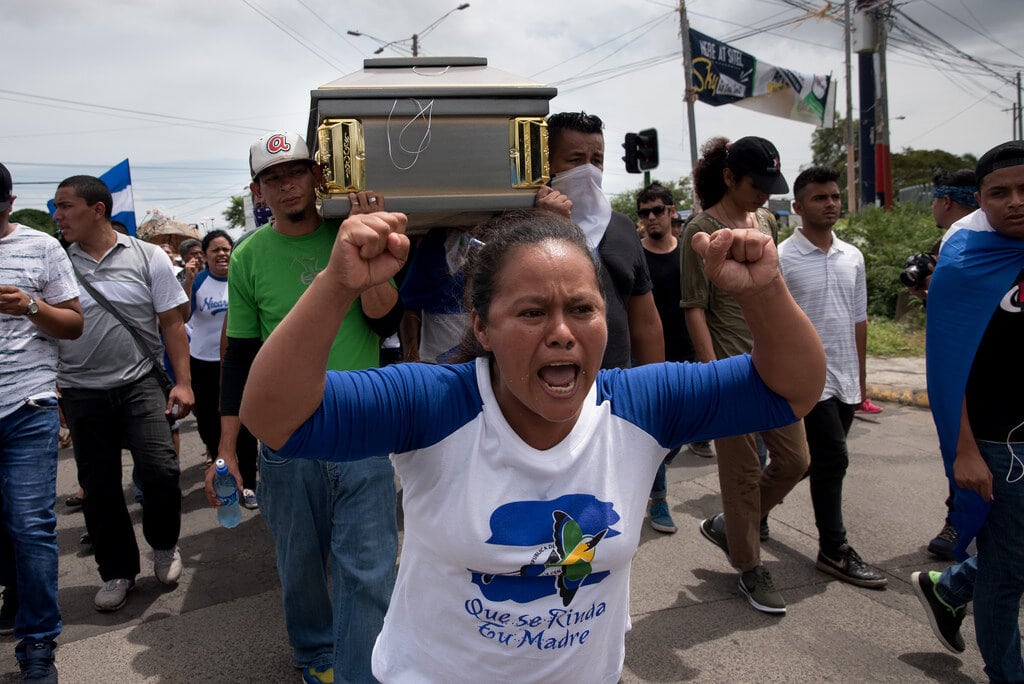
Susana López, demands justice in front of the funeral of her son Gerald Vásquez, killed during the paramilitary attack against UNAN-Managua and the Divina Misericordia parish, in mid-July 2018. Carlos Herrera | Confidencial
After that, came the retaliation. The expulsion of 82 university students who participated in the protests at UNAN-Managua. "They expelled me as if I had been barricaded in the university," details this 27-year-old.
He was not taken by surprise because since May 7, 2018, he had heard threats from some Sandinista professors who promised expulsion for anyone who dared to demonstrate against the regime.
When he entered the system at the end of August of that year he realized that he had been expelled. Although he waited to be summoned by the university authorities, they never called him "to prepare my defense against this unjust expulsion".
Through a lawyer, because he was forbidden to go near the campus again, he was able to get the authorities to give him the sealed transcripts. Elthon also sent letters requesting reinstatement and a review of his case. But the first "was ignored" and the second "was answered by mail" where he was told that his request was inadmissible for being untimely.
With the help of a scholarship he was able to finish his fifth year of medical school at a private university in Matagalpa. But he still has to complete his internship, and to do so he must pay "a high amount that I cannot afford".
For Elthon, part of the hatred that the Sandinista regime has for him is because he was part of the National Union of Students of Nicaragua (UNEN), the political arm of the regime within the universities.
“They saw me because, although I was not the best student, I was very involved in extracurricular activities. For example, I became a student assistant in the physiology class in the Medicine career, I was part of the organizers of the Student Research Congress," says Elthon Rivera.”
However, he notes that he never sympathized with any party. For Elthon "what the April Rebellion meant has been lost". "The social and youth protagonism faded away and turned into something political, where actors emerged that were not well perceived by the Nicaraguan society," he says.
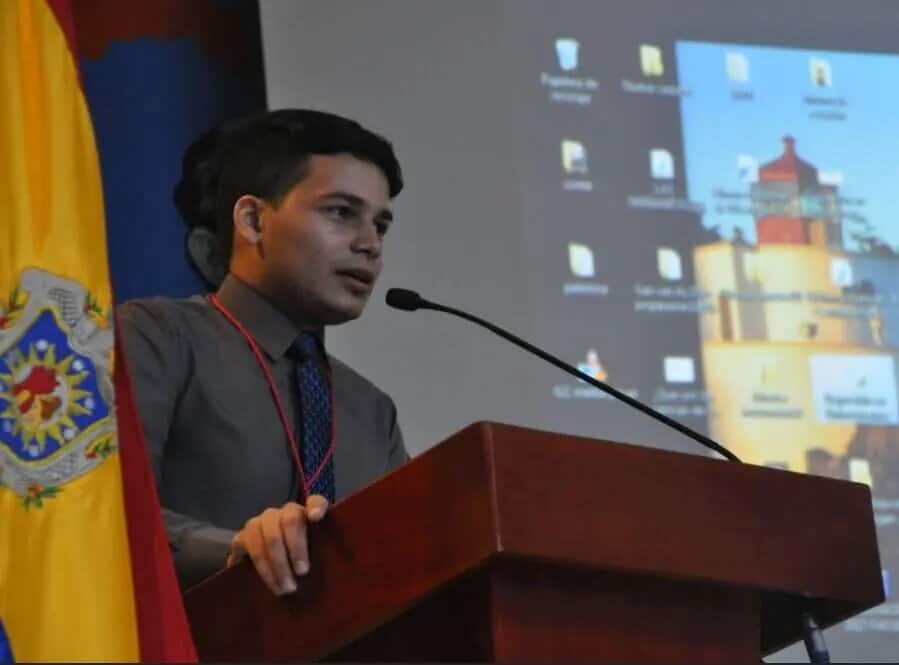
Elthon Rivera // Photo: Courtesy
He is now studying political science thanks to a scholarship. "It was not what I was looking for, I always wanted to be a doctor, but one must adapt to circumstances and opportunities," he says.
Danilo Valerio Pacheco, a biologist from Diriamba, used to make a living doing tourism consulting. But in December 2018 the economic crisis left him unemployed. "Everything collapsed," he says. Although they had a bakery at home, the clientele also began to dwindle.
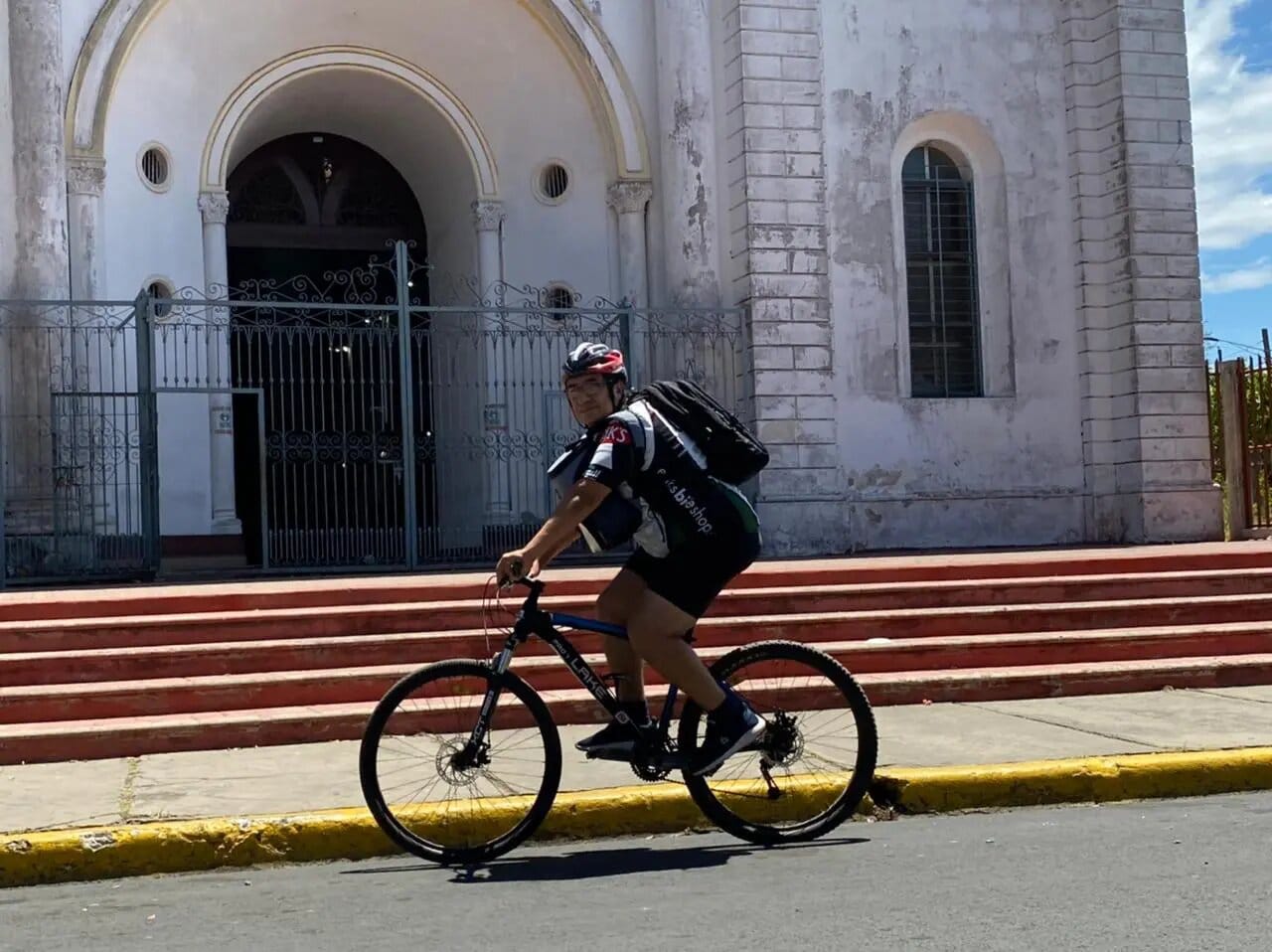
Danilo Valerio now works doing home deliveries to earn income in the midst of the economic crisis. // Photo: Yader Luna | Confidencial
For 20 years he worked to promote sustainable tourism. He worked with the Luxembourg Cooperation. "I have always been a hard worker. There was a time when I had up to seven contracts at a time and made up to $5,000 a month," he recalls.
Being left with nothing from one day to the next worried him. With the money from his liquidation in March 2019 he decided to become an entrepreneur. Together with his eldest daughter he came up with the idea of setting up an online business: "El Rapidín". It was a site on social networks that offered fast food, basic food products, candy, and hygiene products that he delivered by bicycle.
"We started to do well, so much so that we began to hire young people who had their bicycles to help us deliver," he says. Orders were accepted from seven in the morning until nine at night.
Since they already had a clientele for the bakery, the food they offered "flew" off the shelves. However, with the health crisis caused by the covid-19 pandemic, orders began to drop. "It rained on us again and temporarily we almost closed," he says.
They also did so because everyone at home was infected with covid-19 and his mother died from the virus. "It was a hard and painful process, but we had to keep going," he says.
In addition, they began to realize that delivering by bicycle at night was more dangerous because the drivers of motorcycles and three-wheelers "didn't respect us", and similar businesses offering home deliveries began to appear.
"Because of all this, we decided to stop for a while and think about how to diversify. That's how we came up with the idea of setting up a grocery store at home, but we continued to deliver by bicycle," he says.
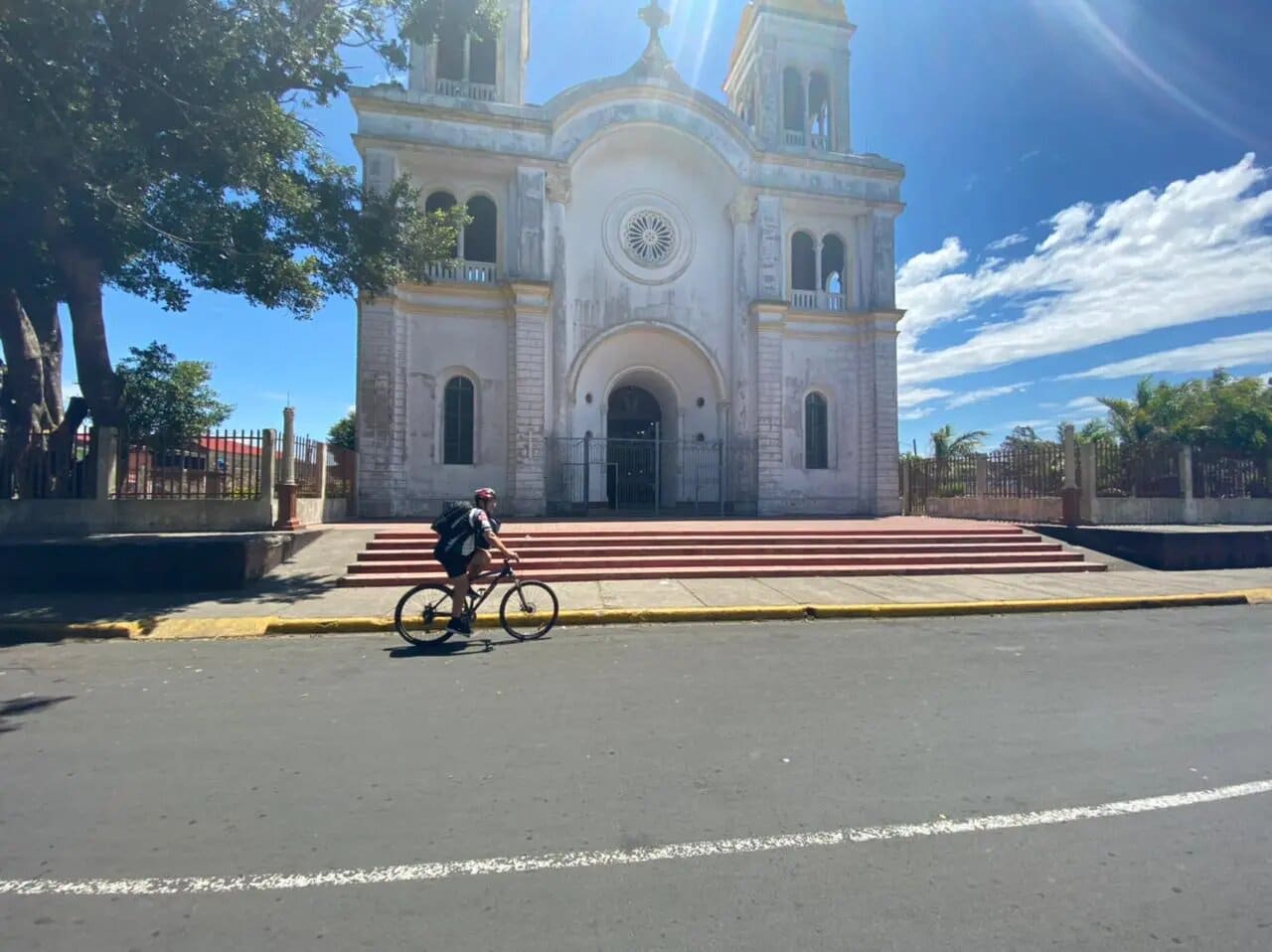
The covid-19 health crisis was a "hard blow" for Danilo Valerio Pacheco's business and family. At home, everyone was infected and his mother died // Photo: Yader Luna | Confidencial
For Danilo, the business has been totally family-run and although it does not generate large profits, it is enough to live on. "We are in a tough moment, the situation is difficult, we are surviving and we have to keep going," he says.
He tries to be optimistic. He recognizes that it is not the job he imagined doing, after a life full of travel, but he enjoys "being able to do something". Bicycle delivery is also a way to exercise and stay healthy.
For the 47-year-old, 2018 was catastrophic. "In countries in upheaval, tourism is reduced and that happened in Nicaragua, and then the covid-19 pandemic continued disrupting our industry. Perhaps it will take years to recover," he explains.
In 2020, 43,000 Nicaraguans lost their jobs, according to a report by the Nicaraguan Foundation for Economic and Social Development (Funides), a number that together with the jobs lost in 2018 and 2019 exceeds 222 000 unemployed, with no prospects of improvement in an economy suffering its fourth year in recession.
"While things improve, I intend to keep pedaling because one needs to hustle," promises Danilo.
This article been translated by Ana María Sampson, a Communication Science student at the University of Amsterdam and member of our staff*
Archivado como:
PUBLICIDAD 3M
Periodista nicaragüense, con dos décadas de trayectoria en medios escritos y digitales. Fue editor de las publicaciones Metro, La Brújula y Revista Niú. Ganador del Grand Prize Lorenzo Natali en Derechos Humanos.
PUBLICIDAD 3D